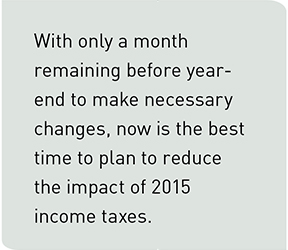HOME | ABOUT US | MEDIA KIT | CONTACT US | INQUIRE
HOME | ABOUT US | MEDIA KIT | CONTACT US | INQUIRE

 */?>
*/?>
As the year comes to a close, small business owners should keep a close eye on several tax planning issues. With only a month remaining before year-end to make necessary changes, now is the best time to plan. The goal of tax planning is to minimize tax liability without sacrificing other business and financial goals. Good planning requires reviewing your situation frequently for opportunities and monitoring and anticipating potential tax legislation.
As we approach year end, we are waiting on Congress to enact the “extenders” tax bill that will extend many of popular items that expired at the end of 2014. Four of the popular extenders for businesses are (1) Bonus Depreciation, which allows businesses to depreciate more than 50 percent of the cost of new equipment purchases in the first year, (2) increased Section 179 small business expensing, which allows businesses to write off 100 percent of equipment purchases, (3) Research and Development tax credit, which allows companies to offset some of their R&D costs, and (4) the Worker Opportunity Tax Credit, which provides tax credits to businesses for hiring certain workers.
Many businesses operate as limited liability companies or S Corporations, where the owners, rather than the business, pay taxes on earnings. When planning for “flow-through” companies, consider the tax situations of the companies’ owners.
Consider these strategies that you can use through the rest of 2015 and early 2016:
Defer income. Businesses using the cash basis for accounting purposes may want to hold off billing and collecting until after Dec. 31 to push the income to 2016.

Accelerate expenses. This includes income and property taxes, and business expenses. Businesses using the cash basis for accounting purposes can generally deduct expenses when paid. Businesses using the accrual basis can generally deduct expenses when incurred, although certain expenses such as salaries and bonuses must be paid on or before March 15, 2016, for an accrual basis calendar year company to deduct on the 2015 tax return. Also, due to a rule change several years ago, accrual-basis companies can change their accounting method to immediately deduct the full amount of certain prepaid expenses rather than spreading the deduction over the period the expense covers.
Consider the AMT impact. While the Alternative Minimum Tax applies to many individuals, it generally does not apply to certain small regular corporations—about 90 percent of small corporations qualify for an exemption. If you have a small regular corporation, be sure you have checked to see if your company is exempt from the AMT to avoid both the administrative burden and the potential additional tax liability. If you will be subject to the AMT, it may be more advantageous to defer deductions that are eliminated in the calculation if AMT won’t apply the next year.
Pay attention to the Manufacturer’s Deduction. The deduction is 9 percent of income from qualified production activities, which represents a valuable tax break for businesses that perform domestic manufacturing and certain other production activities.
Contribute to a Retirement Plan. Even cash-basis businesses can deduct contributions to qualified retirement plans for 2015 as long as the payment is made before the due date for the tax return. Evaluate the needs of employees to determine the best plan solution.
Deduct Repairs & Small Purchases. New rules took effect in 2014 requiring most businesses to change historical accounting methods for buildings and repairs. A de minimis rule allows a business to expense repairs and other items under certain dollar amounts. Calendar-year taxpayers should have a policy stating the specific dollar amount for a book-capitalization policy which will then apply for tax purposes also. For most small businesses, this amount cannot exceed $500 per item; however, if the business has a financial statement audit, the amount can be up to $5,000. A statement describing the policy must be attached with the tax return annually for the de minimis rule to apply.
Improve your Record Keeping. The better your records, the easier it is to find tax-saving strategies and deductions. Also, looking ahead to filing 2016 tax returns in 2017, many of the due dates for filing tax returns have changed. LLCs will need to file by March 15, rather than April 15, with the hopes that the information will be available earlier to the owners. Get your books in better order and closed as quickly as possible.
There are numerous ways to reduce your tax burden even after the year is over. These are just a few. Be sure to discuss these ideas with your tax adviser.